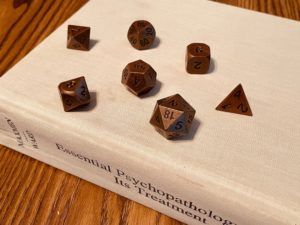
Post Concussion Syndrome
Diagnostics is always more complicated then it seems – more like a DND roll than a simple symptom checklist or binary “has it” or “doesn’t have it” question. Here’s a great example:
Post concussion syndrome (PCS, or postconcussional syndrome) is a relatively vague set of symptoms that can continue to occur well after someone has had a head injury. The symptoms are wide and many of them are mental health symptoms, which is why it’s especially important for us to know about it. A headache is usually accompanied by symptoms like:
- sleep problems
- depressed mood
- irritability
- anxiety
- trouble concentrating
- difficulty with memory
Sound familiar?! YIKES!
In fact, it’s so closely associated with other mental health conditions that 10-20% of student athletes meet criteria for it… even if they haven’t had a head injury – just because they’re stressed and somewhat sleep deprived! So, it’s important to consider all facets of this diagnostic mess!
PCS codes in ICD-10 as F07.81. Now, we probably wouldn’t want to diagnose Postconcussional Syndrome…. but we very well might want to put it in as a Rule Out or make a referral for additional testing/diagnosis with a physician or neuro specialist.
We definitely want to have a question on our intakes that helps us keep this possibility in mind. For example, on my regular intake I have this question:
Have you experienced:
– chronic headache, migraine, vision changes, loss of consciousness, or dizziness?
– changes in your vision, hearing, other senses, or movement? (e.g., blurry vision, ringing in your ears, difficulty swallowing, trouble speaking, weakness or paralysis)
– difficulties with your memory, planning ability, or thinking clearly?
If so, when did you experience these symptoms and for how long?
That allows me to consider PCS, along with some other potential issues such as mild neurocognitive disorder and functional neurological symptom disorder (formerly conversion disorder). These answers can also “flesh out” other conditions, such as chronic headache associated with generalized anxiety disorder or difficulty concentrating as part of a depressive disorder. Loss of consciousness sometimes maps onto a substance use disorder. It’s a big question, but it gives lots of data and paths to follow-up on during the actual intake.
Comment below: What are some of the diagnostically oriented questions you have on your intake?